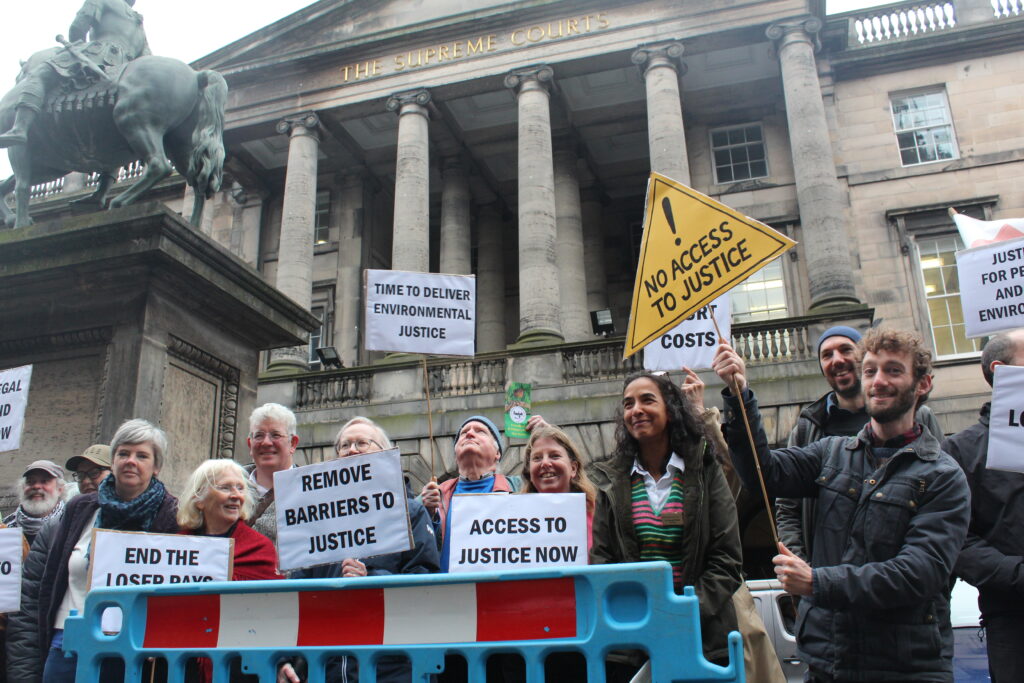
Environmental and human rights campaigners today rallied outside the Court of Session, Scotland’s top civil court, to mark the Scottish Government missing a crucial deadline for compliance with the with the UN Aarhus Convention’s access to justice requirements.
The rally featured speeches from the Environmental Rights Centre for Scotland (ERCS) and community campaigners who have faced unaffordable legal expenses when taking environmental cases to court. Participants symbolically ‘blockaded’ the court with traffic barriers to highlight ongoing barriers to justice, and called on the Scottish Government to remove all the financial obstacles that prevent people from taking environmental cases to court.
In October 2021, the Aarhus Convention’s governing bodies adopted Decision VII/8s – requiring Scotland, as part of the UK, to, ‘as a matter of urgency’ meet six recommendations to make access to justice ‘fair, equitable, timely and not prohibitively expensive’ by 1 October 2024. The Scottish Government has made only minor amendments to court rules which do not fully address the issues relating to court costs, and the First Minister’s 2024-5 Programme for Government dropped both a Legal Aid Reform Bill, and a Human Rights Bill, both of which would have improved access to justice.
Legal costs for environmental litigation can amount to tens or hundreds of thousands of pounds. At the moment, the ‘loser pays rule’ means that litigants have to pay the costs of their opponent if they lose. Although there are some caps to how much this might be, it is still unaffordable and causes a ‘chilling effect’ that prevents environmental cases from ever being taken to court.
Shivali Fifield, ERCS Chief Officer, said:
‘Upholding our environmental rights in court is the ultimate guarantee of the rule of law. Without this credible threat, polluters can act with impunity.
The Scottish Government must take immediate action to replace the ‘loser pays’ rule, reduce courts costs, and expand legal aid, so that we can meet the access to justice requirements of the Aarhus Convention and make our legal system affordable for everyone.‘
Phil Taylor, Director at Open Seas, said:
‘Open Seas took Scottish Ministers to court because they were failing to consider their own Marine Plan, when making decisions about fishing.
Taking legal action like ours is incredibly expensive – equivalent to the annual cost of nearly three members of staff. Our costs were exacerbated by the Government’s appeal, which was weak and sought only to re-litigate the same arguments. Scottish Ministers will have spent even more public money on it given they sought to appeal the decision with a very large entourage of lawyers and officials at court hearings.
The environment needs strong voices to stand up for it and we need the burden of challenging Governmental failures to be reduced. The alternative is more costs to the public purse and more environmental decline which undermines the prospects of future generations in Scotland.‘
ENDS
For more information contact
Benji Brown, Policy & Advocacy Officer
Environmental Rights Centre for Scotland
bbrown@ercs.scot, 07856 407479
NOTES TO EDITORS
[1] The UNECE Aarhus Convention guarantees the right to go to court to challenge decisions, acts and omissions that break environmental law. Article 9 of the Convention requires that access to the courts is fair, equitable, timely and not prohibitively expensive. The United Kingdom ratified the UNECE Aarhus Convention in 2005. Scotland is obliged to ensure that its legal system is compliant with the Convention. https://unece.org/fileadmin/DAM/env/pp/documents/cep43e.pdf
[2] Decision VII/8s concerning compliance by the United Kingdom of Great Britain and Northern Ireland with its obligations under the Convention was adopted by the 7th Meeting of the Parties to the Aarhus Convention in Geneva, October 2021, and followed similar findings of non-compliance in 2011, 2014 and 2017. The decision made a set of recommendations and requested an Action Plan to achieve compliance by 1 October 2024 and is available at: https://unece.org/sites/default/files/2022-01/Decision_VII.8s_eng.pdf (Paragraphs 1(b), 2 (a-d), 9)
[3] The Action Plan as submitted to the Aarhus Convention Compliance Committee by the UK Government is available here: https://unece.org/sites/default/files/2022-07/frPartyVII.8s_01.07.2022_plan_action.pdf and the October 2023 UK Progress Report is available here: https://unece.org/sites/default/files/2023-10/frPartyVII.8s_13.10.2023_report_1.pdf
[4] The Environmental Rights Centre for Scotland has published three briefings evaluating Scotland’s progress towards meeting the Convention’s access to justice requirements:
- Scotland’s new protective expenses rules remain non-compliant with the Aarhus Convention (July 2024)
- Scotland’s lack of progress on delivering access to justice (June 2024)
- Evaluation of Scotland’s action plan on access to environmental justice (July 2022)
[5] The Environmental Rights Centre for Scotland (ERCS) was established in January 2020. We assist the public and civil society to understand and exercise their rights in environmental law and to protect the environment. We carry out advocacy in policy and law reform to improve environmental rights, and full compliance with the Aarhus Convention on access to information, public participation in decision-making, and access to justice on environmental matters. https://www.ercs.scot
[5] Open Seas is a registered Scottish Charitable Incorporated Organisation, governed by a board of experienced and committed Trustees and run by a team that shares a passion for sustainable fish for the benefit of environment and people. https://www.openseas.org.uk/




